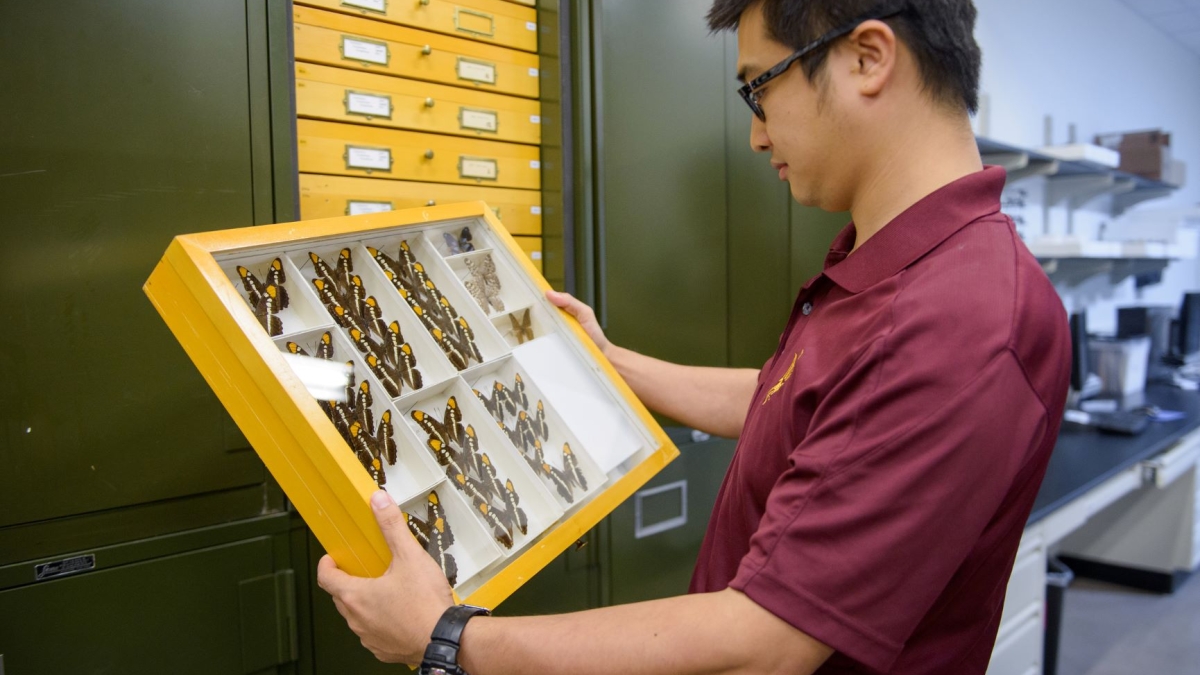ASU center awarded JEDI seed grant to establish biocollections scholars program

Scholars will complete a six-week summer research training experience, which will include a collaborative, curation-based research project and rotations between the core specialties of botany, entomology, vertebrate zoology and bioinformatics.
The College of Liberal Arts and Sciences at Arizona State University has awarded a Justice, Equity, Diversity, and Inclusion (JEDI) seed grant to the School of Life Science’s Biodiversity Knowledge Integration Center to launch a summer scholars program available to underrepresented students.
The natural sciences division of The College and representatives of The College’s JEDI framework accepted proposals from students, staff, faculty and administrators from the School of Life Sciences, the School of Mathematical and Statistical Sciences, the School of Molecular Sciences, the School of Earth and Space Exploration, the Department of Physics and the Department of Psychology. The grant program is part of The College’s JEDI initiative, which seeks to support significant and sustainable contributions to equity and inclusion across The College’s natural sciences division.
The Biodiversity Knowledge Integration Center was awarded $10,000 for their proposal, “Biocollections JEDI Research Fellowship: Facilitating Equity and Inclusivity in Human-Nature Connections.”
“The members of the Biodiversity Knowledge Integration Center and the ASU Biocollections are thrilled to have been selected to receive a Justice, Equity, Diversity, Inclusion grant,” said Kelsey Yule, project manager for the National Ecological Observatory Network Biorepository at ASU, and the lead contact on the fellowship.
“As a group, we began conversations this past summer about how we wanted our center to make a meaningful contribution to ASU's growing JEDI efforts. Receiving this grant means that we will be able to start putting some of those ideas into practice,” she said.
The scholars program will be open to students from ASU, local community colleges and beyond and will engage students with biocollections and Sonoran Desert natural history research, education and outreach.
Scholars will complete a six-week summer research training experience, which will include a collaborative, curation-based research project; rotations between the core specialties of botany, entomology, vertebrate zoology and bioinformatics; and professional development events.
“Each of ASU’s units has the potential to contribute something different, so we focused on leveraging (the center's) unique strengths with our proposal,” Yule said. “(The center's) team was already well-positioned to help people of all ages foster their own connections with nature with our passion for experiencing nature in the field, preserving and conducting research on organisms in our collections, and using biodiversity data to make exciting scientific advancements.”
“I am grateful to everybody for having gotten us this far, and hope that we can succeed with this first cohort of BioKIC JEDI scholars and make the program more expansive and permanent,” said Nico Franz, professor in the School of Life Sciences and director of the center.
The Biodiversity Knowledge Integration Center's mission is to increase our knowledge and understanding of life’s diversity and foster direct and virtual learning experiences with biodiversity data and specimens. The center also strives to promote the use of integrative informatics tools and connects a range of genomic, evolutionary and ecological data science labs with the Natural History Collections community.
Focus on individualized and skills-based research training has proven to positively impact long-term persistence and satisfaction for research-based careers. The scholars program will help students gain the skills and confidence they need to complete undergraduate and graduate degrees in biology through collections and field-based research experiences.
“(The center) was established to foster direct and virtual learning experiences through access to collections spaces and activities,” said Kenro Kusumi, director of the School of Life Sciences. “We are excited to see the launch of this new scholar program that is an innovative new direction towards this mission.”
“Our hope is that this program, as well as the other initiatives across ASU, won’t just bring a more diverse set of scientists to the same table we’ve always had,” Yule said. “These initiatives should help us listen to the perspectives of people we have been excluding and transform our scientific communities into ones that are more just and equitable for all of us.”
More Science and technology

ASU-led space telescope is ready to fly
The Star Planet Activity Research CubeSat, or SPARCS, a small space telescope that will monitor the flares and sunspot activity…

ASU at the heart of the state's revitalized microelectronics industry
A stronger local economy, more reliable technology, and a future where our computers and devices do the impossible: that’s the…

Breakthrough copper alloy achieves unprecedented high-temperature performance
A team of researchers from Arizona State University, the U.S. Army Research Laboratory, Lehigh University and Louisiana State…

